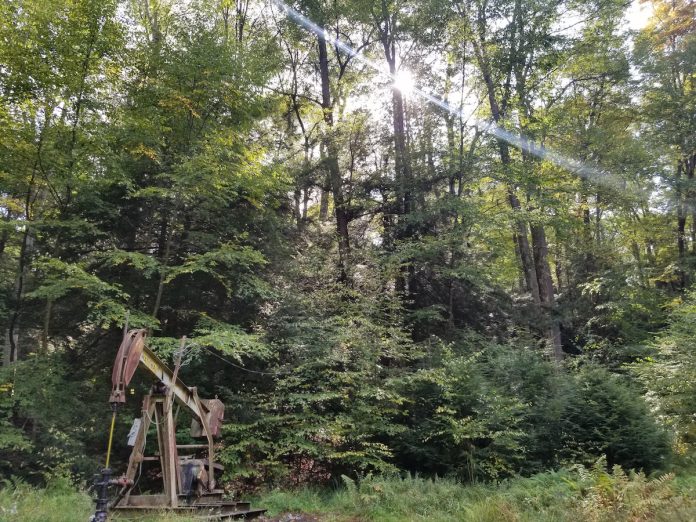
Unplugged orphan and abandoned wells are a problem in Pennsylvania that should be fixed. Everyone agrees on that.
How this problem should be solved continues to be debated. Environmental groups advocate for higher bonding amounts for conventional oil and gas well operators, ones that reflect the true cost of plugging a well.
Currently, the bond required by state law is $2,500 per well and $25,000 for a blanket bond for all wells, but many estimates put the average cost of plugging a well at around $20,000-$30,000, and much more in some cases.
But the actual effectiveness of bonds was brought into question at a recent Pennsylvania House Environmental Resources and Energy Committee where it was revealed that the state Department of Environmental Protection forfeited bonds of non-compliant conventional well operators only twice in the past five years.
“If bonding was an effective cure, we would see bond seizures being used more often,” said Arthur Stewart, president of Cameron Energy, at the April 24 hearing.
In addition to Stewart, the lone representative of the industry, the Sierra Club, Environmental Defense Fund and current and former DEP leaders testified at the hearing that covered orphan wells and bonding for conventional well operators.
The hearing was held in support of legislation introduced by state Rep. Greg Vitali, D-Havertown, chair of the House Environmental Resources And Energy Committee, that would restore the DEP’s authority to adjust bond amounts for conventional oil and gas wells. Act 96 of 2022, enacted last year without the governor’s signature, stripped the ability of the DEP’s Environmental Quality Board to raise bond amounts.
Does it work?
Oil and gas operators are required to set aside money with the state — known as a bond — to prove they have the financial resources to plug wells when the wells are done producing. Wells are required to be plugged after a year of not reporting production. If the operator walks away from a well before plugging it, the bond is supposed to ensure the state has money to pay for the clean-up.
At least, that’s the perception of the purpose of bonding. In reality, it appears that course of action is rarely taken, according to testimony during the hearing, even when operators fail to plug wells they’re finished using.
Conventional well operators were cited more than 3,000 times in the last five years for failing to plug wells upon, according to a DEP study released in December. During that time, the DEP forfeited bonds twice.
State Rep. Marty Causer, R-Coudersport and minority chair of the committee, questioned Kurt Klapkowski, acting secretary for the DEP’s Office of Oil and Gas Management, about why, if abandoned wells are such a massive issue, bonds are hardly ever revoked to pay for plugging.
“I think sometimes we’ve been making decisions about where we employ our enforcement resources, and we’ve decided that they’re better spent in other areas,” Klapkowski said.
The DEP has to weigh the effort put into forfeiting bonds versus the results it gets from it, which presumably isn’t enough money to cover the costs of plugging wells. Klapkowski said the DEP uses a variety of enforcement methods to get operators to comply with the rules, including civil penalties, court orders or jail time, and they’re trying to streamline the process of bond forfeiture to make it a more viable enforcement option.
Debate
Stewart said increased bond amounts would unduly burden smaller operators, which make up most of the state’s conventional industry. He said more than 5,000 of the state’s 5,850 conventional operators own less than 10 wells.
“The mom and pop operators that make up Pennsylvania’s conventional industry do not have access to the investor dollars, credit lines or cash reserves that the increased bonds would require,” he said. “You can’t force mom and pop to do the impossible.”
Stewart also argued in his testimony that increasing the bonding amount now will have no impact on wells drilled before 1984, when bonding regulations were put in place. These wells make up the majority of the state’s abandoned and orphaned wells.
While increasing bond rates won’t fix the existing problem, it could prevent the problem from becoming worse, said Kelsey Krepps, senior campaign representative with the Sierra Club’s Dirty Fuels Campaign, during her testimony.
“Under current Pennsylvania law, operators allow their spent wells to sit unplugged, leaking methane and other harmful emissions into the air and water, harming public health and exacerbating the climate crisis,” she said. “They mar communities, reduce property values and depress the local tax base.”
The Sierra Club, along with PennFuture, the Clean Air Council, Mountain Watershed Association and Protect Penn-Trafford, sent two petitions in September 2021 to the DEP asking its Environmental Quality Board to increase bond amounts and reevaluate bond amounts regularly. The groups suggested increasing the bond to $38,000 per conventional well. That petition was recently denied by the DEP.
Not only will it prevent the burden of abandoned wells from being passed on to taxpayers, but it will “incentive operators to prioritize plugging wells at the end of their lifespan in order to free up capital and faster plugging of unprofitable wells,” Krepps said.
(Reporter Rachel Wagoner can be reached at 724-201-1544 or rachel@farmanddairy.com.)
Related:
Many conventional well operators don’t comply with DEP rules: report
Failure by design: Leaking oil and gas wells slip through the cracks









